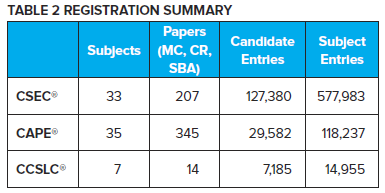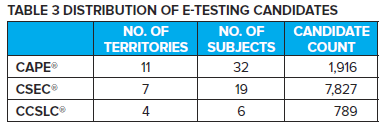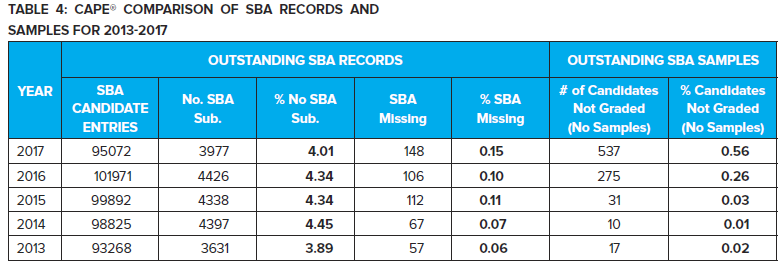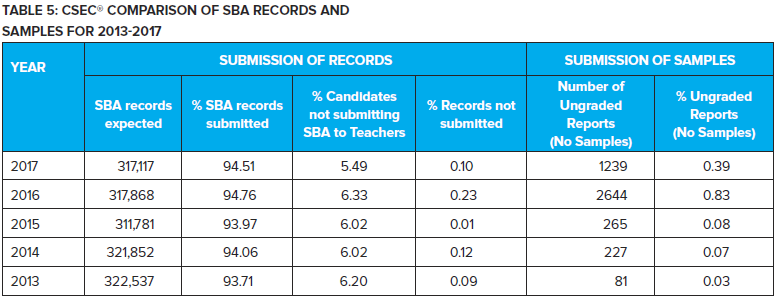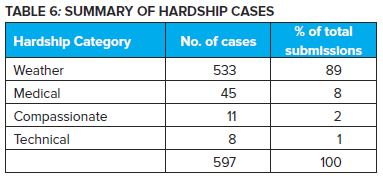![]()
![]()
JANUARY 2017 EXAMINATIONSREGISTRATION The subject entries in January 2017 were 34,570 versus 40,090 subject entries for the January 2016 examination cycle. This figure represented a 14 per cent decline relative to the 2016. Only Chemistry, which increased by 24 per cent, and Physics which increased by 29 per cent, showed increases in 2017. The most significant levels of decline were experienced in English A which declined by 19 per cent, and Human and Social Biology by 22 per cent. E-TESTING
The e-testing was conducted with few challenges which required intervention beyond the level of the centre or the Local Registrar. Most of the issues reported related to login or loss of power at the centres. From the preliminary analysis, the performance of the candidates who wrote the examinations using the electronic method was equivalent to the traditional testing mode. This being the first e-testing session at this level, an exit survey was offered with 30 per cent of the candidate population responding. Of the respondents, 96 per cent of the candidates expressed a favourable assessment of the new modality, and recommended that it be extended to other subjects in the May-June examinations. MARKING OPERATIONS MISCONDUCT RESULTS May-June 2017 Examination Administration
Electronic Testing
While there were very positive reports from most territories, a few reported infrastructural challenges but were still prepared to advance the process. They all reported improved operational efficiency and security over the paper-based administration. Marking Operations All SBA samples were submitted electronically for the May-June sitting. Each sample should have been accompanied by the Teacher’s Cover Pages and mark schemes. This requirement proved challenging for several Centres and forced resubmissions and reloading of files in the ORS late into the session. The marking of the moderating paper (P090) in several subjects was delayed due to issues with transmission of data files from the CXC storage to the RM repository. Issues included:
The efficient marking of English B Paper 2 continued this year with the use of e-Bookmarking; Literatures in English Units 1 and 2, Paper 2 were also included in this process. The challenges with Script Level Additional Objects (SLAOs) and Packet Level Additional Objects (PLAOs), while reduced, still require significant manual intervention. CSEC® Music Paper 020; CAPE® Green Engineering and CAPE® Financial Services Studies were reconfigured late into the cycle. While this was completed without additional costs, it resulted in later than planned commencement and completion of marking. School-Based Assessment This year, several centres opted to submit Group SBAs, a direction the Council formally promoted from 2016. They were 95,072 (95.87%) of the 99,169 registered candidates who submitted their SBA scores, compared to 99.58% in 2016. It was noted that there was a decrease by approximately 6.77% of SBA registration in 2017 over 2016. For 2017, the teachers reported that 3,977 (4.01%) of candidates did not submit their SBAs. The table (Table 4) below shows slight difference (0.33%) of non-submissions, 4.01% in 2017 compared to 4.34% in 2016. Notwithstanding, in 2017, 148 (0.15%) a higher percentage compared to 106 (0.10%) in 2016 were missing their SBA score. Investigations revealed that 537 (0.56%) candidates were reported ungraded “No SBA Sample Received” an increase over 2016 of (0.30%) at the release of preliminary results. Table 4 compares the submissions of SBA records and samples over a five-year period.
At the CSEC® level as well, all Local Registrars were reminded via e-mail communication of the deadlines for the submission of the records and samples. They were also reminded that SBA samples or scores would not be accepted after the absolute deadline of 31 July 2017. Local Registrars were informed that candidates for whom SBA scores or SBA samples that were not received, would be reported “Ungraded: no SBA received”. On-site moderation was implemented for Integrated Science and Technical Drawing in 2017. Agricultural Science, Biology, Chemistry, Industrial Technology, Music and Physics continued to be moderated on-site. Random Sampling was again conducted in the following subjects: Caribbean History, Principles of Accounts, Principles of Business and Technical Drawing. Centres were only required to submit samples for these subjects if requested specifically by CXC. The complete lists of the samples requested were forwarded to each Local Registrar. Candidate entries decreased in 2017 and 317,117 SBA records were expected compared with 317,903 in 2016. The percentage of SBA data records submitted decreased in 2017 when compared with 2016. Of the 317,117 CSEC® SBA records expected, 299,695 were submitted (94.51%) compared with 94.76% in 2016. Some 17,721 SBA records had not been received by CXC, of this number, teachers’ reports suggest that 17,403 had not been submitted by candidates. This accounted for 5.49% of the candidate population. Information had not been received for 318 candidates (0.10%) at the release of Preliminary Results. Table 5 shows comparative data over the last five years.
Hardship Cases
MISCONDUCT RESULTS |
Caribbean Examinations Council © 2017. Copyright protected and may not be reproduced without written consent. The CXC “logo”, Caribbean Examinations Council®, Caribbean Advanced Proficiency Examination®, Caribbean Secondary Education Certificate®, Caribbean Certificate of Secondary Level Competence®, Caribbean Vocational Qualification®, CXC®, CSEC®, CAPE®, CCSLC® and CVQ® are registered trade marks of the Caribbean Examinations Council. They may only be used in accordance with established usage guidelines as outlined in the Council’s Intellectual Property Policy. The Council reserves the right to object to unfair uses, infringements, unauthorised use or other violations of its intellectual property rights.




